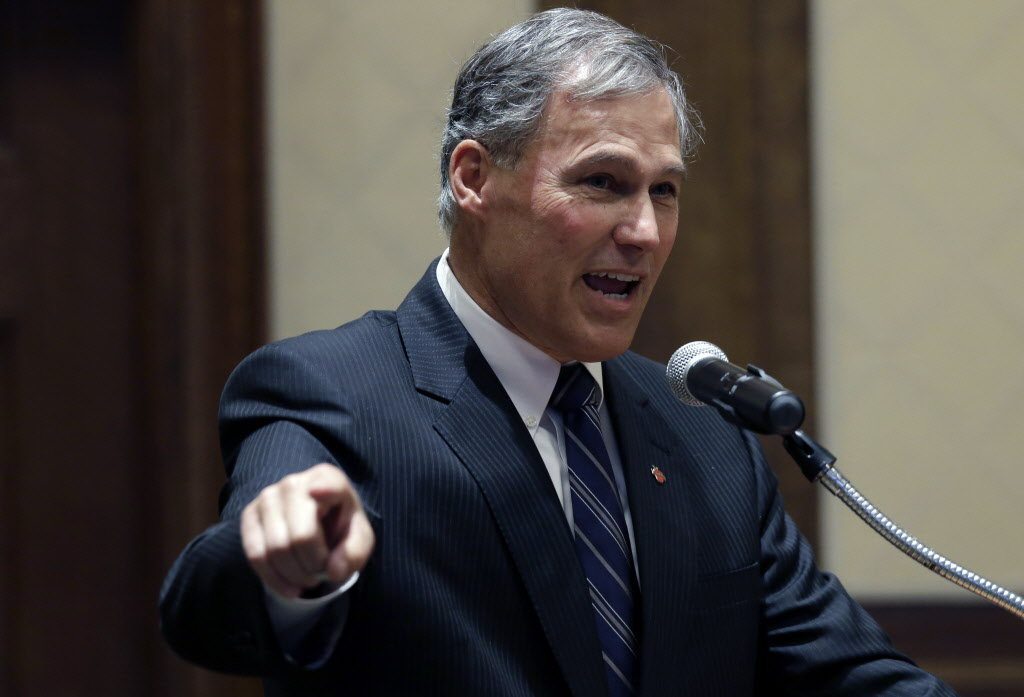Jay Inslee’s only chance to fulfill the gas-price hiking fuel mandate promise he made to fellow extreme “green” Democrats in 2013, when he signed on to a California-Oregon-British Columbia-Washington agreement without legislative input, is to jam through an executive order. He does not have the votes in the State Senate to raise taxes, despite California billionaire Tom Steyer’s efforts to buy Inslee some Senate seats last November, and tepid support at best from Democrats in the state House for his costly agenda.
However, Democrat-dominated Oregon presents a slightly different story than the one Inslee is attempting to write in our state. It’s a story about Democrat corruption and desperation, and it’s a story Washington can learn from.
Democrats managed to pass a fuel mandate in Oregon back in 2009. However, the scheme was tied up in a lawsuit until late last year so it only began taking full effect on Sunday. If lawmakers do not extend the legislation this session, the fuel mandate will expire at the end of 2015.
Democrat Gov. John Kitzhaber has urged lawmakers to pass the extension quickly. In all likelihood, it will pass before the end of session—Democrats control both houses of the Legislature. But, it will not pass without significant controversy.
New evidence surfaced this week revealing that first lady Cylvia Hayes—the fiancé of Kitzhaber—collected $118,000 in “previously undisclosed payments from an out-of-state clean energy group while she was advising the governor on clean energy policy.” An organization called Clean Economy Development Center (CEDC) of Washington, D.C., paid her $30,000 in 2011 and $88,000 in 2012, for ill-defined work in a fellowship position.
The Oregonian reports, “The Energy Foundation, a large San Francisco-based nonprofit organization that promotes energy efficiency and renewable energy, confirmed it footed some of the bills for Hayes’ fellowship.” Interestingly enough, the Energy Foundation receives financial endowments from the Tomkat Charitable Trust. Tomkat is billionaire Tom Steyer’s primary personal vehicle for pumping extreme environmental organizations with money. So, it is probable that Steyer funded Hayes’ “fellowship” as she advised Kitzhaber on… environmental policies in Oregon, including the fuel mandate, that Steyer is pushing up and down the West Coast.
Under Oregon law, public officials are prohibited from “using their positions in government for their private benefit.” Due to her advisory role, Hayes is considered a public official. That means when she advised Kitzhaber on “economic and energy policies while accepting payments from private advocacy groups seeking to influence those same policies,” she was breaking the law.
But, that’s not all. The Oregonian reports that a two longtime associates of Kitzhaber helped create cushy jobs for Hayes “with groups hoping to influence Oregon’s state energy policy.” One of those associates is Dan Carol, a Kitzhaber campaign adviser. Carol arranged for Hayes’ to receive the $118,000 fellowship from CEDC then he “joined Kitzhaber’s staff the same month Hayes started collecting on her fellowship.” Carol receives a yearly salary of $165,720, “far more than anybody else on Kitzhaber’s staff and nearly twice Kitzhaber’s salary of $98,600.” Of course, Kitzhaber denies he hired Carol in return for getting his fiancé a high-paying consulting gig.
According to the Oregonian, Hayes also failed to complete disclosure forms for contracts with Waste to Energy of Texas; HDR One Co., of Portland; and Rural Development Initiatives of Eugene. The newly discovered contracts are in addition to Hayes’ private consulting contracts worth $85,000 with three other advocacy groups that were seeking to influence state and regional policy—a controversy Shift reported on when it sprung up during the midterm elections. Hayes’ assortment of consulting contracts—now totaling $213,000— while in an official advisory position to her fiancé have been hard to track because, as the Oregonian points out, she has failed to disclose her full income on federal income tax forms for years.
That’s the kind of corruption that Oregon’s fuel mandate policy is embroiled in—and Kitzhaber doesn’t appear to think it makes a difference either way. He just wants lawmakers to ignore the corruption and pass the extension “quickly.” Following revelations of the scandal, Republican lawmakers called for the Legislature to hit the breaks on moving forward with the fuel mandate extension bill until the Oregon Ethics Commission completes its review of Kitzhaber and Hayes.
Democrats do not take Republican’s call seriously—they are not even taking Republicans’ cost concerns seriously. A press release issued by Republican state Senator Alan Olsen reveals that the Democrat chair of the Senate Environment and Natural Resource Committee dismissed concerns over the fuel mandate’s economic impact as “theoretical claims based on incomplete information.” Olsen challenged him to invite “industry experts to share accurate and credible information about the economic impact of the Low Carbon Fuel Standard… Instead of fast tracking this issue through the legislative process.” Of course, the challenge will likely be ignored. Oregon Democrats appear all too willing to do what Kitzhaber asks—scandal or not—and pass the extension quickly.
Kitzhaber wants to the Legislature to pass a fuel mandate extension quickly, and Inslee is working to jam through a fuel mandate by executive order quietly. Both are hoping to achieve their ends with little-to-no public opposition or accountability. However, both methods raise a valid and important question: If this policy is so great—if it can stand-up to scrutiny—than why the haste, why the secrecy?




